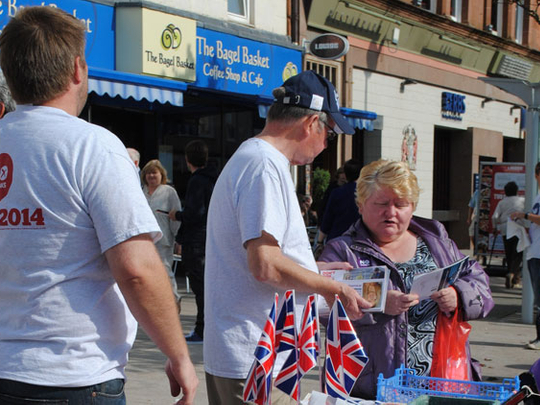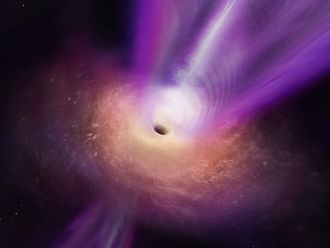
East Kilbride: Locals call this place “the village” — and it does have a bit of a village feel to it. The main street is narrow, there’s a requisite big-chain bookie shop and the path is well trodden across the street between there and the watering hole — also called “The Village.”
At the top end of the main street, a little white circle painted in the middle of the road junction might grow up to be a fully fledged roundabout one day — if it keeps raining and if the cars would stop running over it.
Yes, the village is a small place. But it has an Indian restaurant serving “authentic Scottish Punjabi favourites” like “balti lamb”. You can order it with chips — real big chips, not like the shoestrings served by the American chains. Inside there are the familiar spice and curry smells, but the food is served by Sikh waiters with accents that remind you you’re firmly in Scotland.
“I’m voting ‘yes’,” Gurjiwal says as he waits tables. “I’m a proud Scot and I think it’s time we were allowed to choose our own destiny.”
Just like India came of age in 1947?
“Exactly,” he bobbles. “If Scots don’t choose independence, we would be the first country not to do so when given the chance.”
True. Since the end of the Second World War and the sun began to set on far-flung corners of the British Empire, nations have stepped up one after another, voted for independence and gone their own way.
He leaves to sit a table of eight — an elderly couple and what looks like their daughter’s family, given the large similarities between the female generations.
“I was at the Commonwealth Games two months ago,” Gurjiwal explains after taking their initial orders for drinks and two platters of mixed pakoras with extra curry sauce on the side.
“It hit me then how many countries were competing. They’re all free. But Scotland is not. You had little places from the Caribbean and they were competing as free nations. We’re Scots. And we are still part of the United Kingdom. That doesn’t make sense to me.”
His family left India after partition and moved to Birmingham first, then north to East Kilbride.
“Aye, but we’re all British,” the head of the family of eight interjects. “I was in the Royal Navy and I’ve sailed the world. I’m Scottish and I always will be, but I’m proud to have served my country.”
The pakoras come with the extra curry sauce, and a serving of politics on the side.
“I was in the Falklands” he continues. “I am proud to be British.”
So he’s voting ‘no’?
“Yes,” he answers, “I’m ‘no’.”
“I’m ‘yes’,” the son-in-law chimes in. “I think it’s high time we had control of our own country. If you look at the statistics, Scotland would be the 14th richest country in the world. Why are all of our oil revenues not staying here?”
“I’m ‘yes’ too,” his wife says. “I’m fed up voting and getting stuck with Tory governments in London. I think it’s time we had control over our own affairs.”
But what about the pound?
“Och never mind what they say in London,” the son-in-law says. “We’ll be free and we can do what we want. They cannae stop us.”
The main courses arrive and the debate turns to how hot the dishes whether there’s enough onion.
“The Falklands have held a referendum and they’ve decided to stay with us,” the head of household says. “And here are we Scots, trying to break away.”
Yes, but the choice was also whether the Falklands should be ruled by Argentina.
“Aye, and if we vote ‘yes’ we’ll be like Argentina,” he chuckles. “Broke. And with a dodgy currency.”












